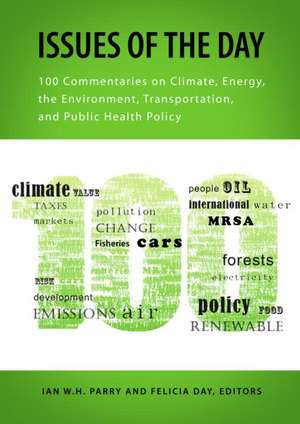Issues of the Day: 100 Commentaries on Climate, Energy, the Environment, Transportation, and Public Health Policy: RFF Report
Autor Ian W.H. Parry, Felicia Dayen Limba Engleză Paperback – 20 mai 2010
Preț: 361.25 lei
Nou
Puncte Express: 542
Preț estimativ în valută:
69.15€ • 75.13$ • 58.12£
69.15€ • 75.13$ • 58.12£
Carte tipărită la comandă
Livrare economică 21 aprilie-05 mai
Preluare comenzi: 021 569.72.76
Specificații
ISBN-13: 9781933115870
ISBN-10: 1933115874
Pagini: 208
Ilustrații: Line drawings
Dimensiuni: 210 x 297 x 17 mm
Greutate: 0.57 kg
Ediția:1
Editura: Taylor & Francis
Colecția Routledge
Seria RFF Report
Locul publicării:Oxford, United Kingdom
ISBN-10: 1933115874
Pagini: 208
Ilustrații: Line drawings
Dimensiuni: 210 x 297 x 17 mm
Greutate: 0.57 kg
Ediția:1
Editura: Taylor & Francis
Colecția Routledge
Seria RFF Report
Locul publicării:Oxford, United Kingdom
Cuprins
Editor's Introduction. Global Environmental Challenges1. Stabilizing Atmospheric CO2 with Incomplete International Cooperation. 2. A Pragmatic Global Climate Policy Architecture. 3. Thinking Beyond Borders: Why We Need to Focus on Global Public Goods. 4. The Value of Climate-Related Satellite Data. 5. The Successful International Response to Stratospheric Ozone Depletion. 6. Evaluating Europe's Plan for Reducing Greenhouse Gases. 7. Climate Change Policy in the United States: Previewing the Debate. 8. Which Is the Better Climate Policy: Emissions Taxes or Emissions Trading? 9. Should Cap-and-Trade Systems be Supplemented with Renewable Portfolio Standards? 10. Inducing Innovation for Climate Change Mitigation. 11. How Should Emissions Allowance Auctions Be Designed? 12. Competitiveness, Emissions Leakage, and Climate Policy. 13. Addressing Biodiversity and Global Warming by Preserving Tropical Forests. 14. Forests in a U.S. Climate Program: Promising, but the Key is Implementation. 15. Emissions Offsets in a Greenhouse Gas Cap-and-Trade Policy. 16. Ethics and Discounting Global Warming Damages. 17. Climate Change Abatement: Not 'Stern' Enough? 18. Evaluating Climate Risks in Coastal Zones. Energy Policies19. Reflections on Three Decades of US Energy Policy. 20. The Oil Security Problem: 'D j Vu All Over Again'. 21. Reassessing Oil Security. 22. The 2008 Oil Price Shock: Markets or Mayhem? 23. The Cost of Protecting Oil in the Persian Gulf. 24. What Role for 'Synthetic' Liquid Fuels? A Look at Canadian Oil Sands. 25. FutureGen: How to Burn Coal-Maybe-without Contributing to Climate Change. 26. The Economics of New Green Technology Investment: The Case of Satellite Solar Power. 27. Oil and the Arctic National Wildlife Refuge. 28. Oil Spills: The Deterrent Effects of Monitoring, Enforcement, and Public Information. 29. Taking a Closer Look at Energy Subsidies in the Federal Tax Code. 30. Learning by Doing and the California Solar Initiative. 31. Opposing the Chicken or Opposing the Egg? New Challenges in Siting Networked Energy Facilities. 32. The Greening of Buildings. 33. Why International Natural Gas Markets Matter in Today's Energy and Environmental Picture. 34. Assessing Electricity Markets: Prospects and Pitfalls. National Environmental Policies35. What Are the Biggest Environmental Challenges Facing the United States? 36. Where Things Stand with Hazardous Waste Regulation. 37. Reinstating the Superfund Taxes: Good or Bad Policy? 38. Trash Talk. 39. The New Economics of Managing the Nation's Waste. 40. Enhancing Productivity while Safeguarding Environmental Quality: The Inherent Challenges in Regulating Pesticides. 41. Why We Need to Treat Nitrogen as a Systems Problem. 42. The Effectiveness of Voluntary Environmental Programs. 43. Does 'Green' Corporate Social Responsibility Benefit Society? 44. The Evolving SO2 Allowance Market: Title IV, CAIR and Beyond. 45. The Cooling Water Intake Structures Rule: An Experiment with More Flexible Regulation. 46. The Future of Regulatory Oversight and Analysis. 47. A Plea for Environmental Accounts. 48. The Political Economy of Environmental Justice. Spencer Banzhaf49. Overcoming Distributional Obstacles to Market-Based Environmental Policies. 50. What Do the Damages Caused by U.S. Air Pollution Cost? 51. What Can Policymakers Learn from Experimental Economics? 52. Environmental Federalism. Managing Natural Resources53. Can Catch Shares Save Fisheries? 54. The Political Economy of Addressing Overfishing in U.S. Waters. 55. Achieving Efficient Coordination and Acceptance in Fishery Reform. 56. Restoring Great Lakes Ecosystems: Worth the Cost? 57. The Gulf of Mexico's Dead Zone: Mess, Problem, or Puzzle? 58. Information Disclosure and Drinking Water Quality. 59. Western Water Law and Efficient Use of Water Resources.60. A New Approach to Reforming the National Flood Insurance Program. 61. Perverse Incentives and the Endangered Species Act. 62. Improving Investments in Biodiversity Conservation. 63. USDA's Conservation Reserve Program: Is It Time to Ease into Easements? 64. How Should We Tackle the Forest Fire Problem? 65. Options Contracts for Contingent Takings: A Tool for Improving Disaster Management. Transportation and Urban Policy66. Triple Convergence toward a Higher Gasoline Tax. 67. The Price of Gas and the Demand for Fuel Economy: Are there any links? 68. Should Distributional Considerations Hold Up Higher Gasoline Taxes? 69. Does the Federal Government Spend Too Much for Highways, or Too Little? 70. The Benefits and Costs of Tighter Fuel Economy Regulations. 71. Pay-As-You-Drive Auto Insurance. 72. What Motivates People to Buy Hybrids? 73. The Outlook for Hydrogen Cars. 74. Useful Lessons from California's Experiment with Congestion Pricing. 75. Congestion Pricing: Lessons from London. 76. Has the Time Come for Truck-Only Toll Lanes? 77. Using the Price System to Reduce Airport Congestion. 78. Delayed: Is Privatizing America's Airports the Answer? 79. Telecommuting: What is it Good For? 80. Declining Traffic Fatalities: Lessons for Developing Countries? 81. Preservation and Development: Can TDRs Improve Land Markets? 82. Is there an 'Efficient' Way to Address Suburban Sprawl? Public Health Policies83. The Value of Health and Longevity. 84. How U.S. and Chinese Citizens Feel about Reducing Mortality Risks. 85. A New Chapter in the History of Malaria Control. 86. The Spread of MRSA: Antibiotic Resistance with a Name. 87. Controlling Tuberculosis: What Is the Benefit, At What Cost? 88. Bringing our Food Safety System into the 21st Century. 89. Tobacco Taxation in the European Union and United States. 90. How Advertising for Smoking-Cessation Products Can Help Meet Public Health Goals. 91. Mercury Advisories for Commercial Fish. 92. Measuring the Benefits of Reduced Exposure to Lead. 93. Indoor Air Pollution and African Death Rates. Environment and Development94. Driving Restrictions and Air Quality in Mexico City. 95. Deciphering the Demand for Safe Drinking Water in Low-Income Countries. 96. Environmental Policy Innovations in Developing Countries. 97. Green Cities and Economic Development. 98. Building Better Housing Policies for the Developing World's Poor. 99. The Future of Famine. 100. Is Population Still an Important Policy Issue?
Recenzii
'What a great idea! Get 100 qualified individuals, or teams, to produce brief, 2-page analyses of urgent policy issues a nontechnical encyclopedia of current issues in climate, energy, ecology, and related topics. My suggestion: read one each day, and think about it all day. In a hundred days you'll be hugely enriched. Only RFF could do this.'Thomas C. Schelling, University of Maryland, Winner of the Nobel Prize in Economics'This unique book offers an impressive set of brief, understandable, and authoritative analyses of 100 issues in the important policy areas on which recent RFF research has focused. It belongs on the bookshelf of everyone who has ever encountered an unfamiliar issue in this broad domain and wondered,What is the best thinking on this? It is a terrific source of readings for courses dealing with public policy.'Richard Schmalensee, Massachusetts Institute of Technology'The short essays in this volume provide a treasure trove of interesting analyses of a variety of important economic policy issues. Instructors in economics and public policy courses will particularly value the clear, sensible, and student-friendly fashion in which microeconomic tools are employed.'Harvey S. Rosen, Princeton University'In this refreshingly different approach to environmental policy, we hear from a very wide variety of the world's environmental economists and policy researchers, with short and pointed opinion pieces. This is great reading and should be valuable for anyone who wishes to appreciate the nuances of solving many of today's pressing environmental problems.'Charles D. Kolstad, University of California, Santa Barbara
Notă biografică
Ian W.H. Parry (Ph.D. U Chicago) is a senior fellow at Resources for the Future. Felicia Day is managing editor in the communications department of Resources for the Future.

















